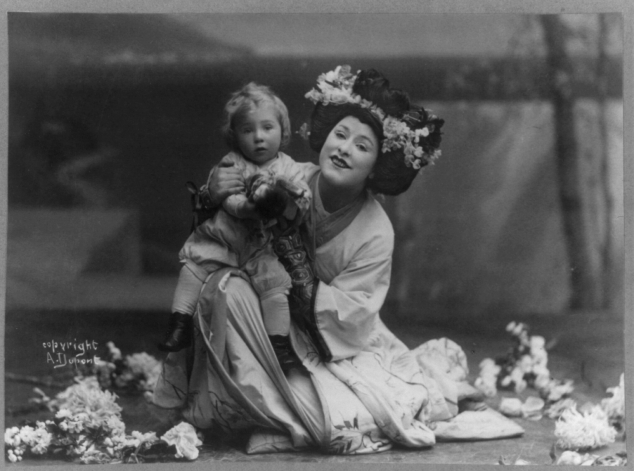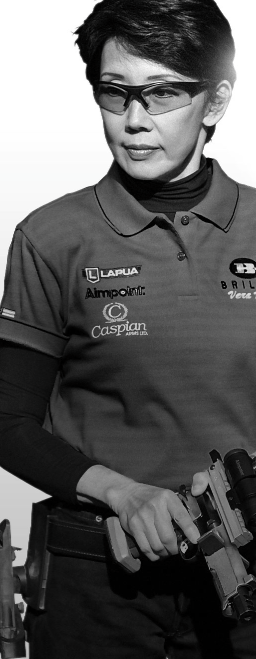Vera Koo explains the concept of the ming thing in relation to shooting.
Have you ever seen “Madama Butterfly?” It is Puccini’s hauntingly beautiful opera that illuminates a world of love, loss and tragedy in Nagasaki, Japan, 1904.
Sponsored by Vera Koo
I was 17 when “Madama Butterfly” first entered my life. Not much older than the main character, a geisha named Butterfly, I saw the misfortunate tale with a date (While his selection of our evening’s entertainment in no way foreshadowed our relationship, I ultimately fell for the man who treated me to my first hamburger, not the one preoccupied with Puccini. I will, however, be forever grateful to him for the operatic introduction.).

Geraldine Farrar, 1882-1967, full length, kneeling child on knee, facing slightly left, in Madame Butterfly. (Wikimedia Commons photo)
Since that evening nearly 60 years ago, I have seen Puccini’s classic work 5 more times, each version more personally powerful and meaningful than the last. I saw it most recently as part of the San Francisco Opera’s 2014 season.
In 3 acts, Puccini tells the story of a woman’s place in the world. A marriage broker oversees the marriage of a young Japanese geisha to a US Naval officer, who plans to return stateside to marry an American woman. Butterfly, the geisha, learns she is pregnant after her husband leaves Nagasaki and waits for his return, refusing to marry again or give up hope. Her husband returns 3 years later with his new American wife. Upon learning of their child, Butterfly’s husband agrees to see Butterfly once she agrees to let her husband and his American wife raise the child. In true histrionic Puccini fashion, Butterfly, having lost everything that she once loved and lived for, commits suicide with her father’s hara-kiri knife.
While this dramatic ending may elicit tears or conversations about East Asian/American history, Japanese culture at the time mirrored Chinese culture: women were subservient. Men took charge of your fate. You had no voice in your own life.
Butterfly’s unrequited wait for her husband’s return illustrated the powerful ideology that, in that time, a woman’s place in society was dedicated to one man and he was her entire reason for living.
The ‘Ming’ thing
In classic Chinese culture, a woman has no ming – no fate. Her ming is determined by her man. Each examination of “Madama Butterfly” has resonated with me at different points of my life, from the search for a husband, to the deep love of a spouse, to the endless love of a mother, to the powerlessness of women in historical culture.
The underlying question, however, that I’ve always sought in Butterfly’s search for identity is this one: who are you and who determines who you are?
When first contemplating my role as a competitive shooter, I dedicated 2 years to the examination of the requirements of the sport; I wanted to see if I had the necessary qualities. I scrutinized my character, my personality, my work ethic, my tenacity and my time. I asked myself if I had the approval of my husband? Would he and my children give me time to do the competitions? Would I have time to practice in preparation for the competition?
My children initially did not accept my newfound sport. Once their friends saw my photograph in magazines, however, they realized what I was accomplishing.
 My mother didn’t think I was home enough and my friends thought I should take up flower arranging or embroidery.
My mother didn’t think I was home enough and my friends thought I should take up flower arranging or embroidery.
But, I felt so strongly about a woman’s fate – even at that time – from the strong, well-educated women whom I witnessed “holding back” to the women who stayed at home, simply because they wanted to be invisible within cultural norms.
I felt that society has buried many educated and strong women. My own culture told me that women should be in our place: at home. No one thought I should be shooting. I had no approval until I had significant success. Once I’d won my world title and two national championships, people began supporting me. They called my quest “unusual” instead of “unfeminine,” “inappropriate” and “un-cultural.”
Today, however, the shooting world has changed dramatically. I still shoot at many regional and state level matches where I am the only woman, but in recent years, more and more women are shooting at the national level and at major competitions. They are rising in the shooting ranks, unafraid of the challenges, constantly improving and investing their time and energies in a world they want to conquer. When I shoot at public ranges, I watch so many more women arriving to take classes. They come with friends, boyfriends or by themselves. These women, like many women pursuing sports, hobbies and activities of their own volition and interests are determining their own ming every day.
I believe that shooting is part of my ming. But it certainly was never part of my plan.
Who would ever have thought that I would have made it? There is a Chinese phrase that speaks to the alignment of heaven, timing, earth, logistics, people, and harmony. Ming is not simply willing yourself to a greater place. Ming speaks to a greater purpose that is partially determined by the alignment of heaven, timing, etc.
To this day, I never arrive at a match expecting to win or wanting to beat someone. Instead, I arrive at every match desiring to improve and perform to my highest ability. I am a workaholic. I love the pressure of competition and the grueling hours of preparation. Whether I walk away with a win or not is immaterial.
Your ming
“Madama Butterfly” didn’t have that choice, nor did most women for centuries across our cultures. But today, women are afforded so many opportunities – from education and voting rights to the ability to pursue excellence in any field of our choice. Today, we have the chance to become whomever and whatever we want to be, and on that path, to find our own ming.
Vera Koo is a first-generation Chinese American woman. She’s a wife and mother, author, entrepreneur and retired competition shooter. Along with two published books -- "The Most Unlikely Champion" and "Wisdom and Things: Essays From an Unlikely Champion" -- she writes her column, Vera Koo, at "Women’s Outdoor News." View all posts by Vera Koo